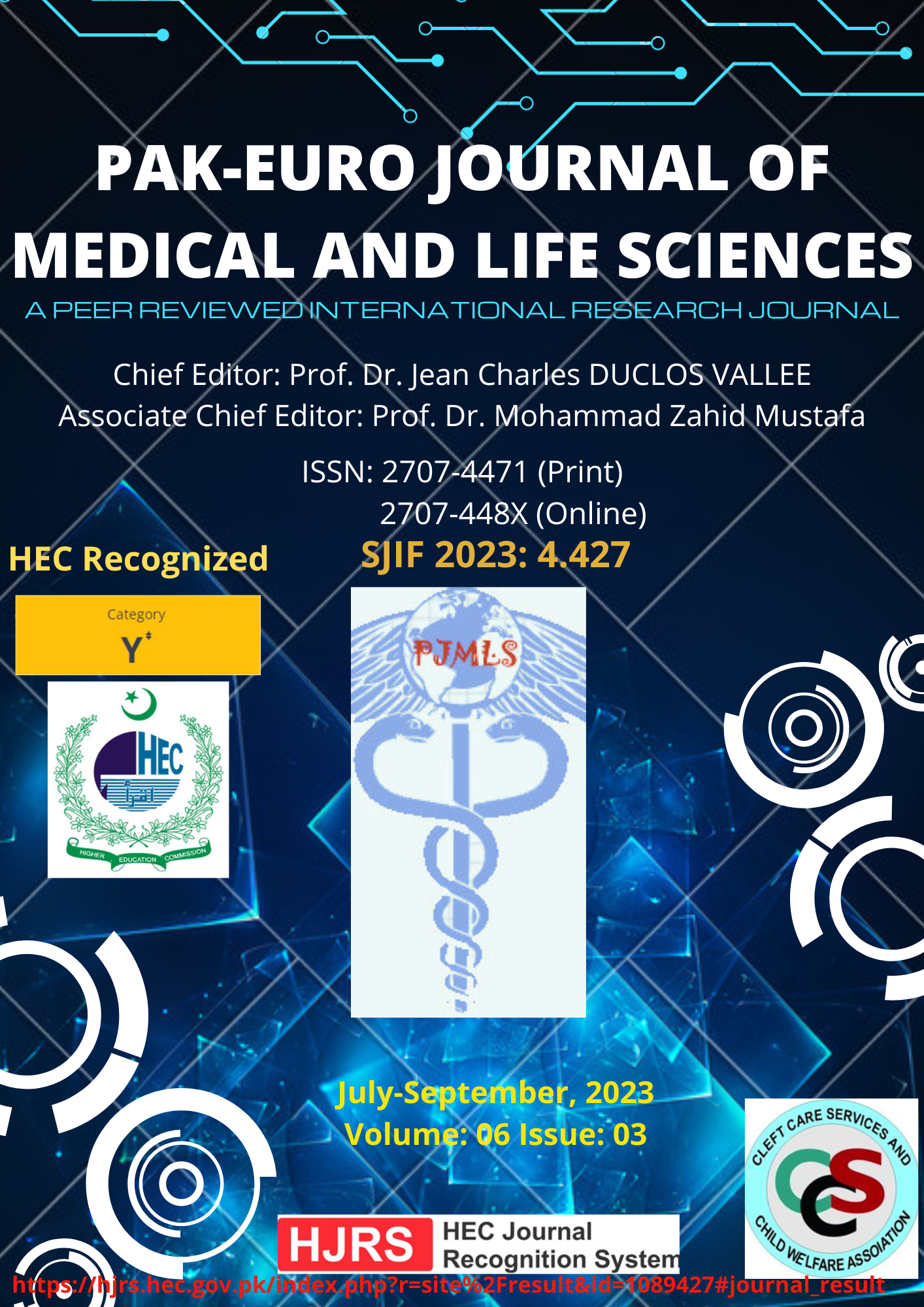Metabolic Profiling of Cancer Cells Identifying Metabolic Vulnerabilities for Targeted Therapy in Patients of Quetta, Balochistan, Pakistan
DOI:
https://doi.org/10.31580/wz50r778Keywords:
Bolan Medical Complex, Cancer cells, Immunotherapy, Metabolic profiling, NMR spectroscopy, Quetta, Targeted therapy, Therapeutic vulnerabilitiesAbstract
The current research was performed from March 2022 until June 2022 by following the guidelines of a joint clinical research committee of Bolan Medical Complex and the University of Balochistan Quetta. The ability to uncover new targets for cancer therapy has made metabolic profiling of cancer cells a crucial field of research in cancer biology. For many years, it has been common practice to utilize NMR spectroscopy, especially in vivo magnetic resonance spectroscopy (MRS) and high-resolution solution-state analysis of tissue extracts, to differentiate between various cell lines and tumor types. Metabolic profiling is the process of analyzing the unique metabolic characteristics of cancer cells compared to normal cells. The cells should be collected under sterile conditions and kept in a suitable medium until analysis. Cancer cells tend to consume large amounts of glucose, even in the presence of oxygen, leading to increased levels of lactate production. Cancer cells may exhibit changes in the regulation of lipid synthesis, storage, and utilization, which can impact cellular signalling and membrane function. By analyzing the metabolites in cancer cells and comparing them to normal cells, researchers can gain insights into the metabolic alterations that occur in cancer. Such cancer cells can be employed for many things, like diagnosis, prognosis, and the creation of fresh therapeutic approaches. In conclusion, metabolic profiling of cancer cells is a rapidly evolving field with the potential to improve our understanding of cancer biology and to identify new therapeutic strategies for cancer. It can be used to identify new targets for immunotherapy. Cancer cell's metabolic properties can affect how they interact with the immune system, and targeting metabolic pathways could enhance the efficacy of immunotherapies.References
Boroughs LK, DeBerardinis RJ. Metabolic pathways promoting cancer cell survival and growth. Nature cell biology. 2015;17(4):351-9.
Pesec M, Sherertz T. Global health from a cancer care perspective. Future Oncology. 2015;11(15):2235-45.
Patel S, Ahmed S. Emerging field of metabolomics: big promise for cancer biomarker identification and drug discovery. Journal of pharmaceutical and biomedical analysis. 2015;107:63-74.
Saavedra-García P, Fan LY, Lam EW. Multifaceted link between metabolism and cancer. Mol Cell Endocrinol. 2018;462(Pt B):65-.
Iqbal MJ, Javed Z, Sadia H, Qureshi IA, Irshad A, Ahmed R, Malik K, Raza S, Abbas A, Pezzani R, Sharifi-Rad J. Clinical applications of artificial intelligence and machine learning in cancer diagnosis: looking into the future. Cancer cell international. 2021;21(1):1-1.
Fuss TL, Cheng LL. Evaluation of cancer metabolomics using ex vivo high resolution magic angle spinning (HRMAS) magnetic resonance spectroscopy (MRS). Metabolites. 2016;6(1):11.
Pandey SS, Shaikh FI, Gupta AR, Vaidya RJ. Mannosylated Solid Lipid Nanocarriers of Chrysin to Target Gastric Cancer: Optimization and Cell Line Study. Current Drug Delivery. 2021;18(10):1574-84.
Lukey MJ, Katt WP, Cerione RA. Targeting amino acid metabolism for cancer therapy. Drug discovery today. 2017;22(5):796-804.
Tajan M, Vousden KH. Dietary approaches to cancer therapy. Cancer Cell. 2020;37(6):767-85.
Daemen A, Peterson D, Sahu N, McCord R, Du X, Liu B, Kowanetz K, Hong R, Moffat J, Gao M, Boudreau A. Metabolite profiling stratifies pancreatic ductal adenocarcinomas into subtypes with distinct sensitivities to metabolic inhibitors. Proceedings of the National Academy of Sciences. 2015;112(32): E4410-7.
Nagao A, Kobayashi M, Koyasu S, Chow CC, Harada H. HIF-1-dependent reprogramming of glucose metabolic pathway of cancer cells and its therapeutic significance. International journal of molecular sciences. 2019;20(2):238.
Lanning NJ, Castle JP, Singh SJ, Leon AN, Tovar EA, Sanghera A, MacKeigan JP, Filipp FV, Graveel CR. Metabolic profiling of triple-negative breast cancer cells reveals metabolic vulnerabilities. Cancer & metabolism. 2017;5(1):1-4.
Schmidt DR, Patel R, Kirsch DG, Lewis CA, Vander Heiden MG, Locasale JW. Metabolomics in cancer research and emerging applications in clinical oncology. CA: a cancer journal for clinicians. 2021;71(4):333-58.
Ganesan R, Yoon SJ, Suk KT. Microbiome and metabolomics in liver cancer: scientific technology. International Journal of Molecular Sciences. 2022;24(1):537.
Smith LK, Rao AD, McArthur GA. Targeting metabolic reprogramming as a potential therapeutic strategy in melanoma. Pharmacological Research. 2016; 107:42-7.
Renner K, Singer K, Koehl GE, Geissler EK, Peter K, Siska PJ, Kreutz M. Metabolic hallmarks of tumor and immune cells in the tumor microenvironment. Frontiers in immunology. 2017; 8:248.
Zeki ÖC, Eylem CC, Reçber T, Kır S, Nemutlu E. Integration of GC–MS and LC–MS for untargeted metabolomics profiling. Journal of Pharmaceutical and Biomedical Analysis. 2020; 190:113509.
Martinez-Outschoorn UE, Peiris-Pagés M, Pestell RG, Sotgia F, Lisanti MP. Cancer metabolism: a therapeutic perspective. Nature reviews Clinical oncology. 2017;14(1):11-31.
Daemen A, Peterson D, Sahu N, McCord R, Du X, Liu B, Kowanetz K, Hong R, Moffat J, Gao M, Boudreau A. Metabolite profiling stratifies pancreatic ductal adenocarcinomas into subtypes with distinct sensitivities to metabolic inhibitors. Proceedings of the National Academy of Sciences. 2015;112(32): E4410-7.
Bai X, Ni J, Beretov J, Graham P, Li Y. Triple-negative breast cancer therapeutic resistance: Where is the Achilles' heel? Cancer letters. 2021; 497:100-11.
Tian Y, Su X, Su Y, Zhang X. EMODMI: A multi-objective optimization based method to identify disease modules. IEEE Transactions on Emerging Topics in Computational Intelligence. 2020;5(4):570-82.
Gaude E, Frezza C. Tissue-specific and convergent metabolic transformation of cancer correlates with metastatic potential and patient survival. Nature communications. 2016;7(1):13041.
Tseng YY, Boehm JS. From cell lines to living biosensors: new opportunities to prioritize cancer dependencies using ex vivo tumor cultures. Current Opinion in Genetics & Development. 2019; 54:33-40.
Downloads
Published
Issue
Section
License
Copyright (c) 2024 Pak-Euro Journal of Medical and Life Sciences

This work is licensed under a Creative Commons Attribution 4.0 International License.






